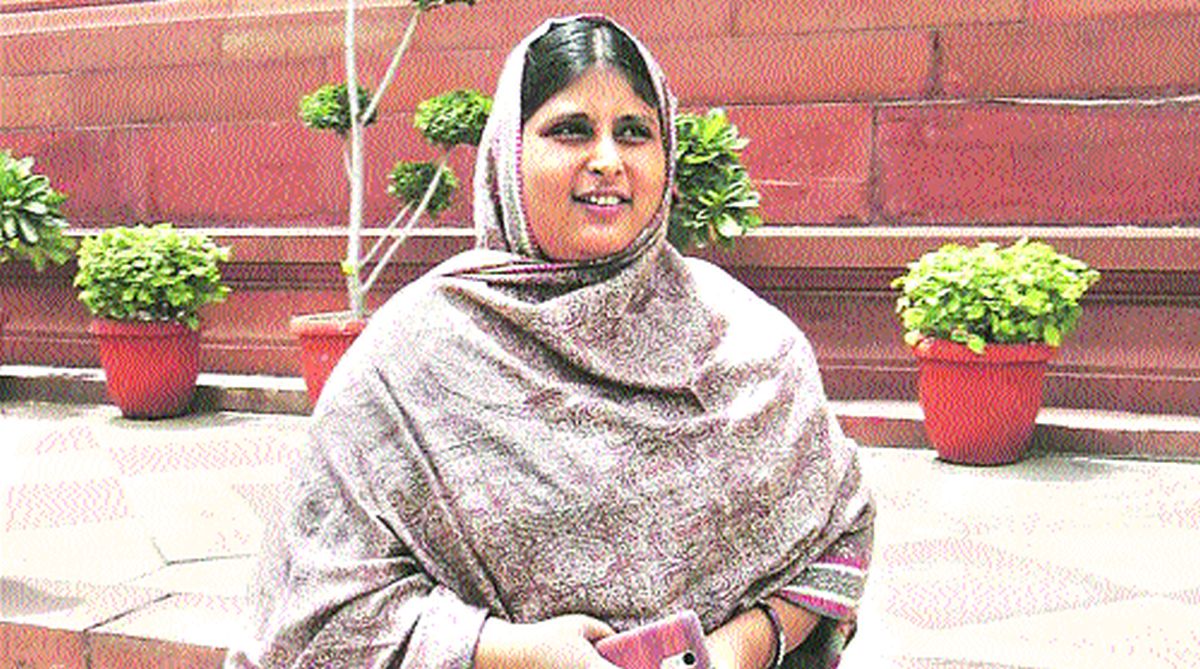Kahkashan Perween is one of the six Vice-Chairpersons of the Rajya Sabha who assist Chairman M Venkaiah Naidu in the conduct of House proceedings.
Educated at Ranchi Women’s College, Kahkashan became Mayor of Bhagalpur when she was just 23 and held the office from 2002 to 2007. She had shifted to Bhagalpur after her marriage.
Advertisement
She was Chairperson, Bihar State Women’s Commission between July-Sept 2010, and then from March 2011 to January 2014. She became a member of the Rajya Sabha in 2014 and has been a member of the Standing Committee on Health, and is, currently, a member of Committees on Empowerment of Women and Information Technology.
On International Women’s Day this year on 8 March, Rajya Sabha members urged the Chairman to nominate a woman member to the panel of Vice-Chairpersons.
The next day, Naidu announced the nomination of Kahkashan Perween, Janata Dal (U) member from Bihar to the panel with effect from the 3 April, 2018. In this interview to DEEPAK RAZDAN, Perween answers questions on the status of women in Bihar and her career. Excerpts:
Q: You were educated at Ranchi; how did you enter politics and become Mayor of Bhagalpur?
A: I got married on 15 October 2000 and shifted to Bhagalpur. In 2002, municipal elections were to be held for Bhagalpur Nagar Nigam. My husband has been a social worker.
Members of his family and my husband’s supporters suggested that I contest the polls. I was allotted Ward 37, which had just become a reserved seat for women. I won.
The Bhagalpur Mayorship was reserved for women and I got 23 votes against my rivals’ 11 and four votes respectively. There were only three women members in the municipal corporation. I was Mayor of Bhagalpur for five years from 2002.
The next municipal election I won from a different ward but lost the Mayor’s election. So, the state government made me vice president of the Zila 20-point programme implementation committee for Bhagalpur.
A city with a population of three lakh, Bhagalpur faced civic problems like any other urban centre, and I presided over the corporation meetings to discuss them.
Q: You were chairperson of Bihar Women’s Commission. What is the status of women in Bihar?
A: Women in Bihar have been quite empowered. Chief Minister Nitish Kumar has taken a number of steps to empower them. He provided for 50 per cent reservation for women in municipal corporations and panchayats and in primary school teachers’ jobs.
The state faced a serious problem of school dropouts and there were an estimated 25 lakh boys and girls who had left school mid-way. The state gave top priority to education. The CM’s programmes like “cycle yojana” brought out girls, who were doing nothing but watching the streets from balconies of their homes.
Bihar became the first state in the country to give 35 per cent reservation in government jobs to women. The various types of reservations started by the Chief Minister allowed a large number of women to enter politics.
As chairperson of the Women’s Commission, I and members of the Commission heard incredible stories of harassment of women in their homes at the hands of their sons or daughters-in-law or mothers-in-law.
Q: As a Rajya Sabha member, how do you select Special Mentions? You have been member of various parliamentary committees also.
A: I can only say a lot of work is done in the committees and I have got good opportunity to contribute. Members rise above party politics to discuss issues. For raising issues of public importance under Special Mentions, I study newspapers and watch television.
Q: What has been your experience as Vice-Chairman of Rajya Sabha; do you feel running the House is a tough job?
A: The Chairman announced my appointment on International Women’s Day. It was a matter of pride for me. I did not have any political background. Bihar has shown it has “woman-power” too, and not just man power. Women are not lagging behind in any way. The House needs the cooperation of all members for its smooth running.
Q: What improvements do you think the Rajya Sabha can make to allow women and Independents to get more time to speak?
A: Time is fixed for parties and still the Chairman allows members to go beyond their allotted time. If 10 minutes are allotted, members speak for 12 minutes. It happens often.
Women are also attached to parties and have to follow the rules. Independents participate serial-wise and get opportunity to speak during debates. The debates have to conclude according to the agreed schedules.
Q: You were made Vice-Chairperson on the last International Women’s Day. What is stopping 33 per cent reservation for women in Parliament?
A: My party leader has supported 33 per cent reservation. We support it. Till women come forward, it will not happen. I hope the government works out a solution.










